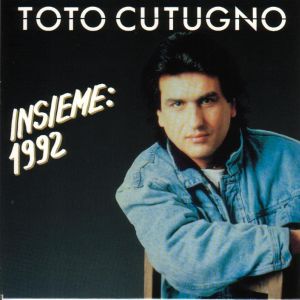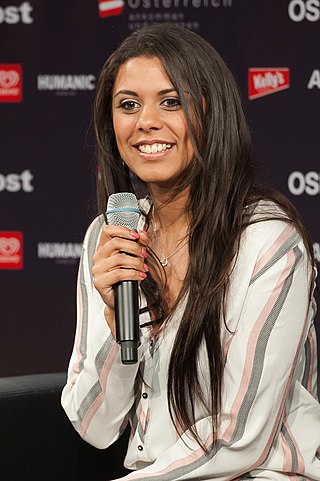Related Research Articles

The Eurovision Song Contest 1990 was the 35th edition of the Eurovision Song Contest, held on 5 May 1990 in the Vatroslav Lisinski Concert Hall in Zagreb, Yugoslavia. Organised by the European Broadcasting Union (EBU) and host broadcaster Radiotelevizija Zagreb on behalf of Jugoslavenska radiotelevizija (JRT), and presented by Oliver Mlakar and Helga Vlahović, the contest was held in Yugoslavia following the country's victory at the 1989 contest with the song "Rock Me" by the group Riva. It was the first contest to be held in the Balkans and the only to be held in a socialist state.

The Eurovision Song Contest 1998 was the 43rd edition of the annual Eurovision Song Contest, held on 9 May 1998 at the National Indoor Arena in Birmingham, United Kingdom. Organised by the European Broadcasting Union (EBU) and host broadcaster the British Broadcasting Corporation (BBC) and presented by Terry Wogan and Ulrika Jonsson, the contest was held in the United Kingdom following the country's victory at the 1997 contest with the song "Love Shine a Light" by Katrina and the Waves.

Switzerland has participated in the Eurovision Song Contest 64 times since its debut at the first contest in 1956, missing only four contests because of being relegated due to poor results the previous year: 1995, 1999, 2001, and 2003. Switzerland hosted the inaugural contest in 1956 in Lugano, where it also won. The country claimed its second victory in 1988, 32 years after the first, and its third in 2024, 36 years after the second win. The Swiss participant broadcaster in the contest is the Swiss Broadcasting Corporation.
Estonia was represented at the Eurovision Song Contest 1994 with the song "Nagu merelaine", composed by Ivar Must, with lyrics by Leelo Tungal, and performed by Silvi Vrait. The Estonian participating broadcaster, Eesti Televisioon (ETV), organised the national final Eurolaul '94 in order to select its entry for the contest. Ten songs competed in the national final and "Nagu merelaine" performed by Silvi Vrait was selected as the winner by a jury panel. This was the first-ever entry from Estonia in the Eurovision Song Contest, and the first-ever entry performed in Estonian in the contest.

"Rock Me" is a song recorded by Croatian pop band Riva with music composed by Rajko Dujmić and lyrics written by Stevo Cvikić. It represented Yugoslavia in the Eurovision Song Contest 1989, held in Lausanne, resulting in the country's only ever win at the contest.

"Insieme: 1992" is a song written and recorded by Toto Cutugno. It represented Italy in the Eurovision Song Contest 1990, held in Zagreb, resulting in the country's second victory in the contest.

"Dors, mon amour" is a love song recorded by French singer André Claveau with music composed by Pierre Delanoë and French lyrics written by Hubert Giraud. It represented France in the Eurovision Song Contest 1958, held in Hilversum, resulting in the country's first win in the contest.
Switzerland was represented in the Eurovision Song Contest 1988 with the song "Ne partez pas sans moi", composed by Atilla Şereftuğ, with lyrics by Nella Martinetti, and performed by Céline Dion. The Swiss participating broadcaster, the Swiss Broadcasting Corporation, selected its entry through a national final. The entry eventually won the Eurovision Song Contest.
Switzerland participated at the Eurovision Song Contest 2010 with the song "Il pleut de l'or" written by Michael von der Heide, Pele Loriano and Heike Kospach. The song was performed by Michael von der Heide, who was internally selected by the Swiss broadcaster SRG SSR idée suisse to represent the nation at the 2010 contest in Oslo, Norway. "Il pleut de l'or" was announced as the Swiss entry on 18 December 2009, while the song was presented to the public on 9 January 2010.
Carol Rich is a Swiss singer, best known for her participation in the 1987 Eurovision Song Contest.
Denmark was represented at the Eurovision Song Contest 1990 with the song "Hallo Hallo", composed by John Hatting and Torben Lendager, with lyrics by Keld Heick, and performed by Lonnie Devantier. The Danish participating broadcaster, Danmarks Radio (DR), organised the Dansk Melodi Grand Prix 1990 in order to select its entry for the contest.
Estonia was represented at the Eurovision Song Contest 1998 with the song "Mere lapsed", composed by Maria Rahula and Tomi Rahula, with lyrics by Peeter Pruuli, and performed by Koit Toome. The Estonian participating broadcaster, Eesti Televisioon (ETV), organised the national final Eurolaul '98 in order to select its entry for the contest. Ten songs competed in the national final and "Mere lapsed" performed by Koit Toome was selected as the winner by a jury panel.
Switzerland participated in the Eurovision Song Contest 2013 with the song "You and Me" written by Georg Schlunegger, Roman Camenzind and Fred Herrmann. The song was performed by the band Takasa. The Swiss entry for the 2013 contest in Malmö, Sweden was selected through the national final Die grosse Entscheidungs Show 2013, organised by the Swiss German speaking broadcaster Schweizer Fernsehen (SF) in collaboration with the other broadcasters part of the Swiss Broadcasting Corporation. SF, the Swiss-French broadcaster Radio Télévision Suisse (RTS) and the Swiss-Italian broadcaster Radiotelevisione svizzera (RSI) each conducted varying selections and a total of nine entries were selected to advance to the televised national final—four artists and songs from the SF selection, three from the RTS selection and two from the RSI selection. The nine finalists performed during the national final on 15 December 2012 where public voting ultimately selected "You and Me" performed by Heilsarmee as the winner. The group was renamed as Takasa for the Eurovision Song Contest in order to prevent violating the rules of the competition.
Switzerland was represented at the Eurovision Song Contest 1998 with the song "Lass ihn", written by Egon Egemann and Gunvor Guggisberg, and performed by Gunvor himself. The Swiss participating broadcaster, the Swiss Broadcasting Corporation, selected its entry through a national final. Six entries performed during the national final on 18 December 1997 where regional televoting selected "Lass ihn" performed by Gunvor as the winner. Songwriter Egemann had represented Switzerland in 1990 with the song "Musik klingt in die Welt hinaus".

Mélanie René, also known as Meylz, is a Swiss singer and songwriter. She represented Switzerland in the Eurovision Song Contest 2015 with the song "Time to Shine".
Switzerland participated at the Eurovision Song Contest 2019 with the song "She Got Me" written by Laurell Barker, Frazer Mac, Luca Hänni, Jon Hällgren and Lukas Hällgren. The song was performed by Luca Hänni, who was internally selected by the Swiss broadcaster Swiss Broadcasting Corporation to represent the nation at the 2019 contest in Tel Aviv, Israel. "She Got Me" was presented to the public as the Swiss entry on 7 March 2019.
Switzerland originally planned to participate in the Eurovision Song Contest 2020 with the song "Répondez-moi" performed by Gjon's Tears and written by Gjon's Tears along with Xavier Michel, Alizé Oswald and Jeroen Swinnen. The song was internally selected by the Swiss broadcaster Swiss Broadcasting Corporation to represent the nation at the 2020 contest in Rotterdam, Netherlands. "Répondez-moi" was presented to the public as the Swiss entry on 4 March 2020.
Switzerland participated in the Eurovision Song Contest 2021 with the song "Tout l'univers" performed by Gjon's Tears and written by Gjon's Tears along with Wouter Hardy, Nina Sampermans and Xavier Michel. The song was internally selected by the Swiss broadcaster Swiss Broadcasting Corporation to represent the nation at the 2020 contest in Rotterdam, Netherlands, after they were due to compete in the 2020 contest with "Répondez-moi" before the 2020 event's cancellation. "Tout l'univers" was presented to the public as the Swiss entry on 10 March 2021.
Switzerland participated in the Eurovision Song Contest 2022 in Turin, Italy, with "Boys Do Cry" performed by Marius Bear and written by Marius Bear along with Martin Gallop. Marius Bear was internally selected by the Swiss broadcaster Swiss Broadcasting Corporation to represent the nation at the 2022 contest. "Boys Do Cry" was presented to the public as the Swiss entry on 8 March 2022.
References
- ↑ Official Programme of the 1990 Eurovision Song Contest